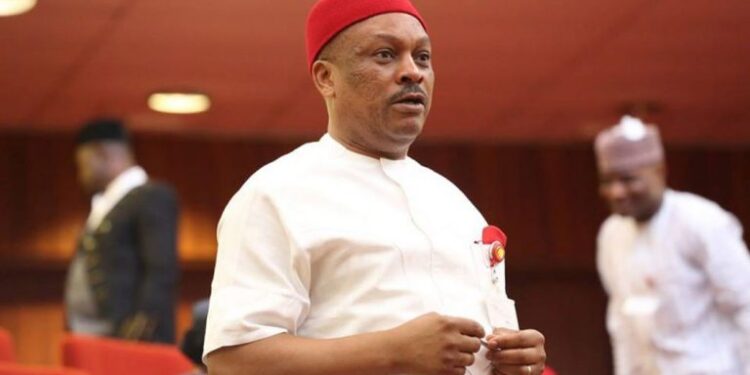Kingsley Obuye- Abuja
The Supreme Court of Nigeria on Monday deferred its judgment in the appeal lodged by Samuel Anyanwu, the embattled Secretary of the Peoples Democratic Party (PDP), challenging his removal from office.
In his appeal, Anyanwu seeks to overturn the ruling of the Court of Appeal in Enugu, which had affirmed the Federal High Court’s decision to remove him from his position as the party’s Secretary.
Through his counsel, Ken Njemanze (SAN), Anyanwu filed a ten-ground appeal, urging the apex court to allow his appeal and set aside the lower court’s verdict.
The respondents in the appeal, marked SC/CV/82/2025, include Aniagu Emmanuel, the PDP, Ambassador Iliya Damagun (National Chairman), and High Chief Ali Odefa (National Vice Chairman, Southeast Zone, PDP), listed as the first to fourth respondents, respectively.
Anyanwu challenged the Court of Appeal’s decision, delivered on 20 December 2024, which affirmed the High Court’s judgment removing him as PDP National Secretary and recognising Sunday Udey-Okoye as his replacement.
Dissatisfied with the majority ruling of the appellate court, Anyanwu approached the Supreme Court to set aside its judgment.
He argued that the Court of Appeal erred in law by upholding the trial court’s jurisdiction over a matter concerning the internal affairs of the PDP.
Anyanwu contended that issues related to party leadership and membership are non-justiciable and fall outside any court’s jurisdiction.
Additionally, he criticised the lower court for failing to rule on whether the plaintiff had complied with the mandatory internal dispute resolution mechanisms stipulated in the PDP constitution before filing the suit.
He also faulted the court’s decision to grant the plaintiff locus standi to institute the case, arguing that such issues are fundamental to the court’s jurisdiction over the matter.
Furthermore, Anyanwu challenged the lower court’s interpretation of Section 84(12) of the Electoral Act 2022, asserting that he neither resigned nor was removed from his position as National Secretary.
He emphasised that the PDP constitution outlines specific procedures for vacating executive offices, including removal or resignation.
He also argued that Article 47 of the PDP constitution provides for a four-year single term for party officers, and there was no legal basis for the lower courts’ concurrent findings that he had vacated his office.
At the resumed hearing of the appeal, all parties in the suit adopted their processes, except for the PDP and Damagun, who did not file any processes.
The respondents unanimously urged the court to dismiss the appeal.
Citing Ali Modu Sheriff vs PDP, senior counsel Erokoro urged the apex court to depart from its earlier decision that political party matters are internal and beyond the jurisdiction of any court.
He further argued that Anyanwu had resigned and that the trial court had already ruled on the matter.
“The lower court says he has resigned because the constitution states that you must resign if you intend to conduct an election,” he said.
However, the apex court questioned whether it had the power to decide who should hold an office.
On his part, Njemanze maintained that the lower courts lacked jurisdiction to entertain the suit, as it pertained to the internal affairs of the PDP.
“My Lords, I have identified all the processes filed by the appellant. I adopt all these processes and, with the greatest respect, urge my Lords to allow this appeal.
“There are procedures for such matters. My Lords, in all your judgments in the past year, you have consistently held that issues of leadership in political parties are non-justiciable. The lower and trial courts had no jurisdiction over this issue,” Njemanze argued.
Following Njemanze’s submission, the five-member panel of the Supreme Court, presided over by Justice Uwani Musa Abba-Aji, reserved judgment.
“Judgment is reserved to a date that will be communicated to the parties,” Justice Abba-Aji ruled.
Meanwhile, earlier in the proceedings, the apex court struck out Anyanwu’s motion for a stay of execution.
Erokoro had drawn the court’s attention to the motion.
Initially, the apex court held that the stay of execution motion could not be entertained.
However, Erokoro pointed out that the motion was still pending and should be withdrawn before it could be struck out.
Upon his submission, Njemanze applied to withdraw the motion.
“I apply to withdraw the application for a stay of execution filed on February 5, 2025,” he said.
Erokoro and the other respondents did not object to the withdrawal.
The apex court subsequently struck out the motion.
Justice Abba-Aji ruled, “The application for a stay of execution, filed on February 5, was withdrawn without any objection from either party.”








































Discussion about this post